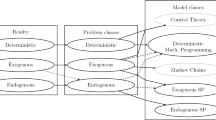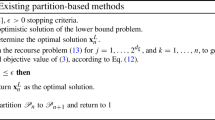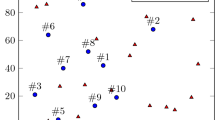Abstract
We present a method to solve two-stage stochastic linear programming problems with fixed recourse when the uncertainty space can have either discrete or continuous distributions. Given a partition of the uncertainty space, the method is addressed to solve a discrete problem with one scenario for each element of the partition (subregions of the uncertainty space). Fixing first-stage variables, we formulate a second-stage subproblem for each element, and exploiting information from the dual of these problems, we provide conditions that the partition must satisfy to obtain an optimal solution. These conditions provide guidance on how to refine the partition, iteratively approaching an optimal solution. The results from computational experiments show how the method automatically refines the partition of the uncertainty space in the regions of interest for the problem. Our algorithm is a generalization of the adaptive partition-based method presented by Song and Luedtke for discrete distributions, extending its applicability to more general cases.




Similar content being viewed by others
References
Angulo, G., Ahmed, S., Dey, S.S.: Improving the integer L-shaped method. INFORMS J. Comput. 28(3), 483–499 (2016). https://doi.org/10.1287/ijoc.2016.0695
Artzner, P., Delbaen, F., Eber, J.M., Heath, D.: Coherent measures of risk. Math. Finance 9(3), 203–228 (1999)
Barik, S., Biswal, M.P., Chakravarty, D.: Two-stage stochastic programming problems involving some continuous random variables. J. Uncertain Syst. 7(4), 277–288 (2013)
Beasley, J.E.: OR-library: distributing test problems by electronic mail. J. Oper. Res. Soc. 41, 1069–1072 (1990). https://doi.org/10.2307/2582903
Bienstock, D., Zuckerberg, M.: Solving LP relaxations of large-scale precedence constrained problems. In: International Conference on Integer Programming and Combinatorial Optimization, pp. 1–14. Springer (2010). https://doi.org/10.1007/978-3-642-13036-6_1
Birge, J.R., Wets, R.J.B.: Designing approximation schemes for stochastic optimization problems. In: Particular for Stochastic Programs with Recourse, pp. 54–102. Springer, Berlin (1986). https://doi.org/10.1007/BFb0121114
Botev, Z.I.: The normal law under linear restrictions: simulation and estimation via minimax tilting. J. R. Stat. Soc. Ser. B (Stat. Methodol.) 79(1), 125–148 (2017). https://doi.org/10.1111/rssb.12162
Crainic, T.G., Maggioni, F., Perboli, G., Rei, W.: Reduced cost-based variable fixing in two-stage stochastic programming. Ann. Oper. Res. (2018). https://doi.org/10.1007/s10479-018-2942-8
Edirisinghe, N.C.P., Ziemba, W.T.: Tight bounds for stochastic convex programs. Oper. Res. 40(4), 660–677 (1992). https://doi.org/10.1287/opre.40.4.660
Edmundson, H.: Bounds on the expectation of a convex function of a random variable. Tech. rep., The RAND Corporation (1956)
Espinoza, D., Moreno, E.: A primal-dual aggregation algorithm for minimizing conditional value-at-risk in linear programs. Comput. Optim. Appl. 59(3), 617–638 (2014). https://doi.org/10.1007/s10589-014-9692-6
Higle, J.L., Sen, S.: Stochastic decomposition: an algorithm for two-stage linear programs with recourse. Math. Oper. Res. 16(3), 650–669 (1991). https://doi.org/10.1287/moor.16.3.650
Homem-de-Mello, T., Bayraksan, G.: Monte Carlo sampling-based methods for stochastic optimization. Surv. Oper. Res. Manag. Sci. 19(1), 56–85 (2014). https://doi.org/10.1016/j.sorms.2014.05.001
Kall, P., Mayer, J.: Stochastic Linear Programming. International Series in Operations Research & Management Science, vol. 156, 2nd edn. Springer, Berlin (2011)
Kleywegt, A.J., Shapiro, A., Homem-de-Mello, T.: The sample average approximation method for stochastic discrete optimization. SIAM J. Optim. 12(2), 479–502 (2002). https://doi.org/10.1137/S1052623499363220
Lagos, G., Espinoza, D., Moreno, E., Vielma, J.P.: Restricted risk measures and robust optimization. Eur. J. Oper. Res. 241(3), 771–782 (2015). https://doi.org/10.1016/j.ejor.2014.09.024
Lemaréchal, C., Nemirovskii, A., Nesterov, Y.: New variants of bundle methods. Math. Program. 69(1–3), 111–147 (1995). https://doi.org/10.1007/BF01585555
Linderoth, J., Shapiro, A., Wright, S.: The empirical behavior of sampling methods for stochastic programming. Ann. Oper. Res. 142(1), 215–241 (2006). https://doi.org/10.1007/s10479-006-6169-8
Louveaux, F.V., Smeers, Y.: Optimal investments for electricity generation: a stochastic model and a test problem. In: Ermoliev, Y., Wets, R.J.B. (eds.) Numerical Techniques for Stochastic Optimization Problems. Springer, Berlin (1988)
Madansky, A.: Bounds on the expectation of a convex function of a multivariate random variable. Ann. Math. Stat. 30(3), 743–746 (1959). https://doi.org/10.1214/aoms/1177706203
Muñoz, G., Espinoza, D., Goycoolea, M., Moreno, E., Queyranne, M., Letelier, O.R.: A study of the Bienstock–Zuckerberg algorithm: applications in mining and resource constrained project scheduling. Comput. Optim. Appl. 69(2), 501–534 (2018). https://doi.org/10.1007/s10589-017-9946-1
Oliveira, W., Sagastizábal, C., Scheimberg, S.: Inexact bundle methods for two-stage stochastic programming. SIAM J. Optim. 21(2), 517–544 (2011). https://doi.org/10.1137/100808289
Pay, B.S., Song, Y.: Partition-based decomposition algorithms for two-stage stochastic integer programs with continuous recourse. Ann. Oper. Res. (2017). https://doi.org/10.1007/s10479-017-2689-7
Pereira, M.V., Pinto, L.M.: Multi-stage stochastic optimization applied to energy planning. Math. Program. 52(1–3), 359–375 (1991). https://doi.org/10.1007/BF01582895
Rahmaniani, R., Crainic, T., Gendreau, M., Rei, W.: A benders decomposition method for two-stage stochastic network design problems. Tech. Rep. CIRRELT-2017-22, Centre interuniversitaire de recherche sur les réseaux d’entreprise, la logistique et le transport (2017)
Rahmaniani, R., Crainic, T.G., Gendreau, M., Rei, W.: Accelerating the benders decomposition method: application to stochastic network design problems. SIAM J. Optim. 28(1), 875–903 (2018). https://doi.org/10.1137/17M1128204
Rahmaniani, R., Crainic, T.G., Gendreau, M., Rei, W.: An asynchronous parallel benders decomposition method. Tech. Rep. CIRRELT-2019-49, Centre interuniversitaire de recherche sur les réseaux d’entreprise, la logistique et le transport (2019)
Rockafellar, R.T., Uryasev, S., et al.: Optimization of conditional value-at-risk. J. Risk 2, 21–42 (2000). https://doi.org/10.21314/JOR.2000.038
Rockafellar, R.T., Wets, R.J.B.: Scenarios and policy aggregation in optimization under uncertainty. Math. Oper. Res. 16(1), 119–147 (1991). https://doi.org/10.1287/moor.16.1.119
Ruszczyński, A.: A regularized decomposition method for minimizing a sum of polyhedral functions. Math. Program. 35(3), 309–333 (1986). https://doi.org/10.1007/BF01580883
Ryan, K., Rajan, D., Ahmed, S.: Scenario decomposition for 0-1 stochastic programs: improvements and asynchronous implementation. In: 2016 IEEE International Parallel and Distributed Processing Symposium Workshops, pp. 722–729. IEEE (2016). https://doi.org/10.1109/IPDPSW.2016.119
Shapiro, A., Dentcheva, D., Ruszczyński, A.: Lectures on Stochastic Programming: Modeling and Theory. MOS-SIAM Series on Optimization. SIAM, Philadelphia (2014)
Siddig, M., Song, Y.: Adaptive partition-based SDDP algorithms for multistage stochastic linear programming. Tech. rep. (2019). arXiv:1908.11346
Song, Y., Luedtke, J.: An adaptive partition-based approach for solving two-stage stochastic programs with fixed recourse. SIAM J. Optim. 25(3), 1344–1367 (2015). https://doi.org/10.1137/140967337
van Ackooij, W., de Oliveira, W., Song, Y.: Adaptive partition-based level decomposition methods for solving two-stage stochastic programs with fixed recourse. INFORMS J. Comput. 30(1), 57–70 (2017). https://doi.org/10.1287/ijoc.2017.0765
Van Slyke, R.M., Wets, R.: L-shaped linear programs with applications to optimal control and stochastic programming. SIAM J. Appl. Math. 17(4), 638–663 (1969). https://doi.org/10.1137/0117061
Vielma, J.P., Ahmed, S., Nemhauser, G.L.: A lifted linear programming branch-and-bound algorithm for mixed-integer conic quadratic programs. INFORMS J. Comput. 20(3), 438–450 (2008). https://doi.org/10.1287/ijoc.1070.0256
Watson, J.P., Woodruff, D.L.: Progressive hedging innovations for a class of stochastic mixed-integer resource allocation problems. CMS 8(4), 355–370 (2011). https://doi.org/10.1007/s10287-010-0125-4
Wolf, C., Fábián, C.I., Koberstein, A., Suhl, L.: Applying oracles of on-demand accuracy in two-stage stochastic programming—a computational study. Eur. J. Oper. Res. 239(2), 437–448 (2014). https://doi.org/10.1016/j.ejor.2014.05.010
Zverovich, V., Fábián, C.I., Ellison, E.F., Mitra, G.: A computational study of a solver system for processing two-stage stochastic LPs with enhanced benders decomposition. Math. Program. Comput. 4(3), 211–238 (2012). https://doi.org/10.1007/s12532-012-0038-z
Author information
Authors and Affiliations
Corresponding author
Additional information
Publisher's Note
Springer Nature remains neutral with regard to jurisdictional claims in published maps and institutional affiliations.
Supported by ANID/CONICYT-Fondecyt Regular 1161064 and 1200809.
Rights and permissions
About this article
Cite this article
Ramirez-Pico, C., Moreno, E. Generalized adaptive partition-based method for two-stage stochastic linear programs with fixed recourse. Math. Program. 196, 755–774 (2022). https://doi.org/10.1007/s10107-020-01609-8
Received:
Accepted:
Published:
Issue Date:
DOI: https://doi.org/10.1007/s10107-020-01609-8
Keywords
- Two-stage stochastic programming
- Adaptive partition-based approach
- Continuous distribution
- Scenario aggregation




